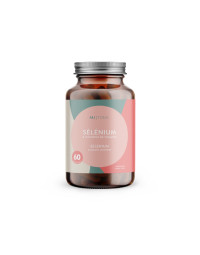
Selenium & tomatoes lycopene, antioxidants, nutricosmetics & UV
During the development of our nutricosmetic kit (supplements for the anti-aging effect on the skin, to keep skin "young" a long time), Jean-Yves suggested selenium and lycopene. We therefore submitted a unique formulation, with a cocktail of genuine - and not synthetic - antioxidants to offer our skin an additional dose of choice antioxidants, always with the aim of supporting its anti-aging side.
Lycopene - Nutraceutical Properties
- Lycopene is a carotenoid that gives vegetables and fruits their red color. Due to its chemical structure, lycopene acts as an antioxidant, which is the basis of its health benefits. Oxidative stress is recognized as an important agent in many chronic diseases; thus, lycopene seems to be a universal remedy. Lycopene has the greatest antioxidant potential among carotenoids.1
Selenium - Selenium levels and skin diseases
- Several studies have examined the association between selenium levels and skin diseases. A systematic review and this meta-analysis were conducted to evaluate the association between selenium levels and skin diseases. 2 Twenty-seven studies were identified and grouped to compare selenium levels in people with skin diseases. Conclusion: Selenium levels were associated with several skin diseases and the severity of the disease, and high selenium levels tended to be a protective factor in certain skin diseases.
Selenium - Role of micronutrients in skin health and function
- Selenium protects the skin from oxidative stress induced by UV irradiation by stimulating the activities of selenium-dependent antioxidant enzymes, glutathione peroxidase and thioredoxin reductase. The results of human studies have shown that selenium supplementation led to an increase in glutathione peroxidase levels in patients with psoriasis, resulting in an improvement of the disease. A deficiency in selenium has been detected in patients with recessive dystrophic epidermolysis bullosa, making the level of selenium a marker for this disease. Moreover, its deficiency is associated with an increased risk of skin cancer.3
Selenium & Lycopene
- UV rays are a source of free radicals. Antioxidants help combat the effects of oxidative damage caused by UV rays.
- We combine our selenium with a cocktail of antioxidants composed of tomato lycopene (and not synthetic) to align with the idea of an essential cofactor in our body's antioxidant pathways to reduce UV damage.
A randomized clinical study 4 on the photoprotection of human skin irradiated with UV rays was conducted, in double-blind, with parallel groups of healthy young women and placebo-controlled to study the preventive and photoprotective effect of an antioxidant formulation containing both lipids and water and soluble compounds: carotenoids (beta-carotene and lycopene), vitamins C and E, selenium, and proanthocyanidins.
Endogenous antioxidants are diminished in the skin and blood during UV exposure. Combined supplementation with beta-carotene, alpha-tocopherol, and ascorbic acid in addition to topical sunscreens can help reduce the risk of sunburn.
Acute UV erythema with sunburn reaction is the most important factor in conjunction with the cumulative UV dose throughout life to induce skin damage leading to photoaging and precancerous and cancerous lesions.
In this study, the oral administration of this formulation appeared to be well tolerated. This formulation contains antioxidant compounds in quantities occurring at physiological levels and can therefore be safely used over a long period.
Despite the fact that the evaluation of light sensitivity (minimal erythema dose, chromametry) of the skin did not show statistically significant differences between the group taking the formulation and the placebo group, a clear statistical trend could nevertheless be demonstrated, namely that the formulation was able to slow down the time of development and the degree of erythema induced by UVB.
The collected data highlight that the supplementation found in the formulation reduces the UV-induced expression of matrix metalloproteinases (the main efficacy parameter), MMP-1 and 9, which could be important in photoprotective processes. In conclusion, the data from this study demonstrate that through the combination of antioxidants included in this formulation, selective skin protection against irradiation can be achieved.
Other interesting points:
The justification of selenium in inflammatory bowel diseases
A viewpoint based on this mechanism was evaluated in a study. 5 Strengths have been observed:
- Selenium deficiency is a common finding in inflammatory bowel diseases and increases with the severity of the disease;
- It contributes to the effective functioning of the antioxidant system and alleviates colitis;
- It contributes to the healing of mucous membranes by modifying the immune response;
- It can improve the protective gut microbiota, which is diminished in inflammatory bowel diseases;
- Selenium can prevent colorectal cancer by modulating several signaling pathways.
Selenium is known for its purported anti-inflammatory properties. It is necessary for the biosynthesis of selenoproteins with enzymatic activity, which contribute to antioxidant defense and the efficient functioning of the immune system. Several studies have shown that patients with inflammatory bowel diseases have lower selenium levels than healthy subjects. Previous studies have indicated that selenoproteins can inhibit the inflammatory response and reduce oxidative stress.
Brain, depression, mood, heavy metals
Dr. Jean-Pierre Willem mentions the following points: 6 :
- Subjects consuming selenium noticed an improvement in their depressive symptoms after a supplementation of 100 mcg per day. It improves mood.
- Through its numerous actions, selenium helps combat brain aging (free radicals) but also ensures good cognitive functions and a balanced mood. Regarding Alzheimer's disease, numerous observations have shown that the concentration of selenium in the brain was nearly 50% lower than that of controls not affected by this disease.
- Powerful antioxidant that protects the cell against the toxic effects of heavy metals (arsenic, mercury, lead), alcohol, tobacco smoke, and various atmospheric pollutants.
References :
1. Małgorzata Grabowska, Dariusz Wawrzyniak, Katarzyna Rolle, Piotr Chomczyński, Stefan Oziewicz, Stefan Jurga, Jan Barciszewski. Let food be your medicine: nutraceutical properties of lycopene. Food Funct. 2019 Jun 19;10(6):3090-3102. doi: 10.1039/c9fo00580c. https://pubmed.ncbi.nlm.nih.gov/31120074/
2. Jun Lv, Ping Ai, Shuying Lei, Faqiong Zhou, Shangzhou Chen, Yang Zhang. Selenium levels and skin diseases: systematic review and meta-analysis. J Trace Elem Med Biol. 2020 Dec; 62:126548. doi: 10.1016/j.jtemb.2020.126548. Epub 2020 May 20. PMID: 32497930 DOI: 10.1016/j.jtemb.2020.126548 https://pubmed.ncbi.nlm.nih.gov/32497930/
3. Kyungho Park. Role of Micronutrients in skin health and function. Biomo Ther (Seoul) 2015 May; 23(3): 207–217.Published online 2015 May 1. doi: 10.4062/biomolther.2015.003 PMCID: PMC4428712 PMID: 25995818 https://www.ncbi.nlm.nih.gov/pmc/articles/PMC4428712/
4. Anne-Katrin Greul, Jens-Uwe Grundmann, Felix Heinrich, Inka Pfitzner, Jürgen ernhardt, Andreas Ambach, Hans-Konrad Biesalski, Harald Gollnick. Photoprotection of UV-irradiated human skin: an antioxidative combination of vitamins E and C, carotenoids, selenium and proanthocyanidins. Skin Pharmacol Appl Skin Physiol. Sep-Oct 2002;15(5):307-15. doi: 10.1159/000064534. PMID: 12239424 https://pubmed.ncbi.nlm.nih.gov/12239424/
5. Moein Ala M.D., Zahedin Kheyri M.D. The rationale for selenium supplementation in inflammatory bowel disease: A mechanism-based point of view. Nutrition Volume 85, May 2021, 111153. https://www.sciencedirect.com/science/article/abs/pii/S0899900721000150
6. Jean-Pierre Willem. Je veux être un jeune centenaire : Les incontournables pour se soigner et rester en bonne santé. Éditions Dudauphin, 10 octobre 2013. ISBN : 9782716314930
Warning: Maison Jacynthe disclaims all responsibilities. The information contained on this page does not seek to substitute a justified allopathic treatment nor to dismiss the expertise of the medical profession. It is up to each individual to take charge of their health, to inform themselves, and to make the necessary changes to improve their condition. Therapeutic supervision by a qualified healthcare professional is obviously recommended.




